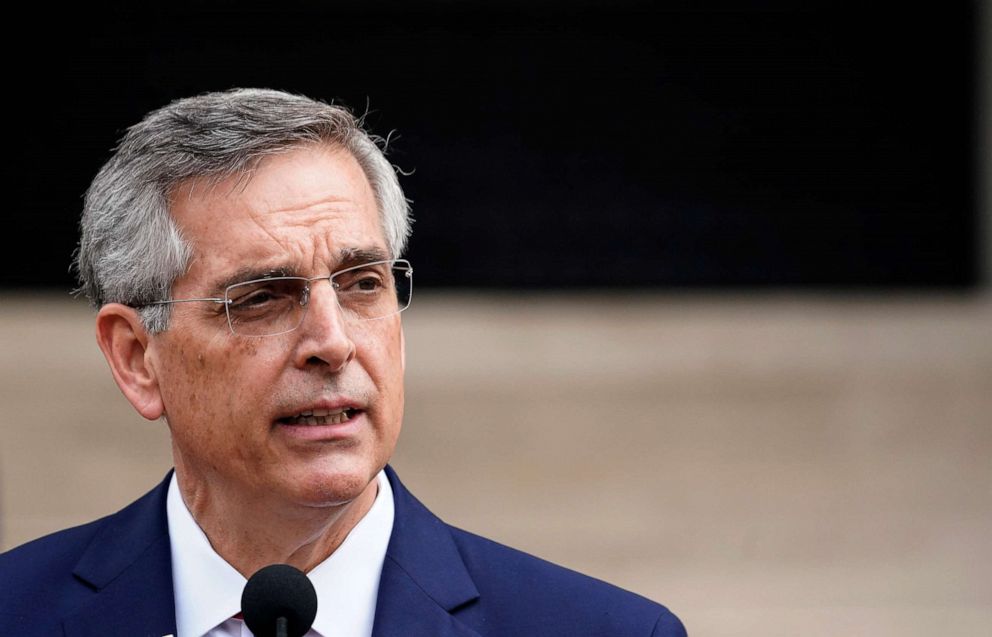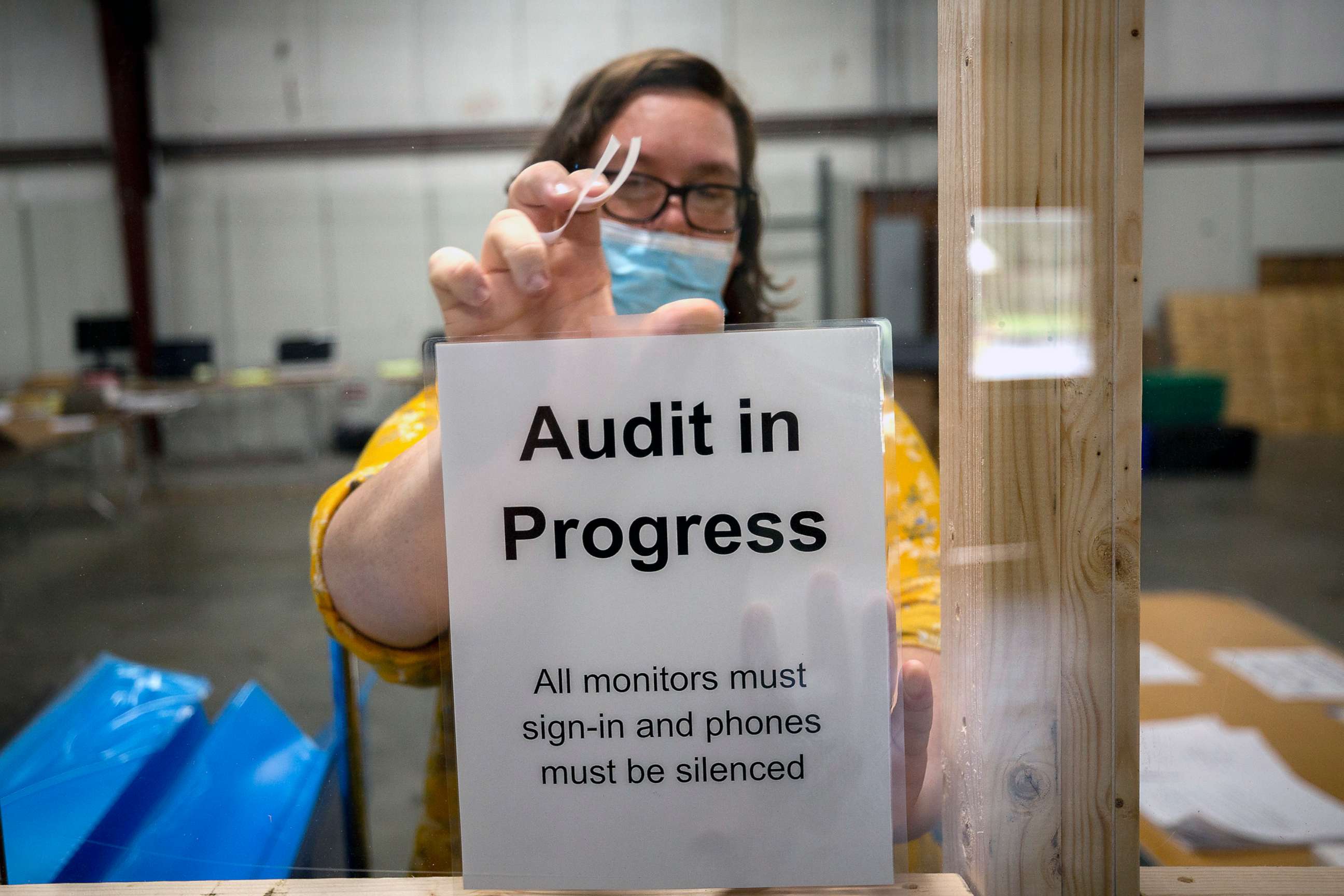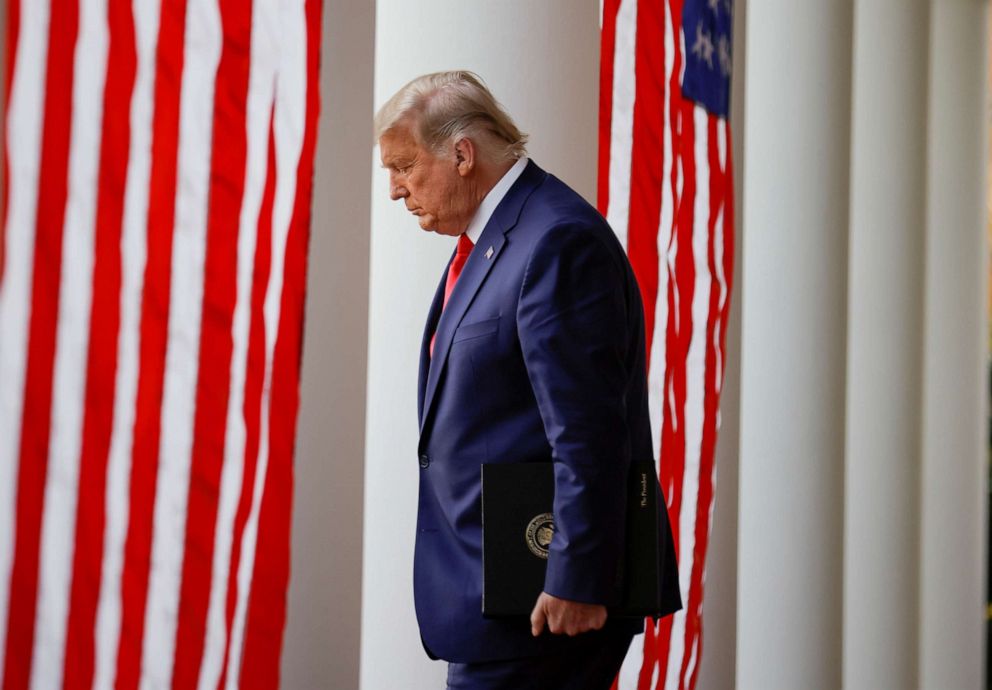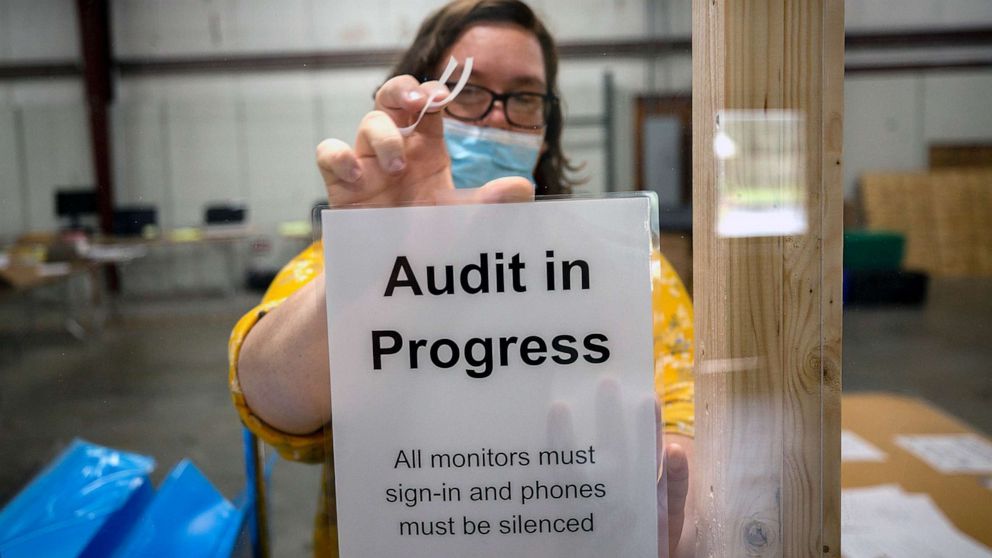Refuting falsehoods, Georgia election officials defend integrity of audit, election
All of Georgia's 159 counties are on track to finish a full hand-count audit of the presidential contest by Wednesday's midnight deadline, and while uncounted votes have been found in four counties, the secretary of state's office has continued to refute false claims about the audit and the election, defending the integrity of both.
Secretary of State Brad Raffensperger said Tuesday that he didn't expect the results to change significantly once the audit was completed, telling ABC News Senior Congressional Correspondent Mary Bruce that he believed President-elect Joe Biden would win The Peach State "fair and square."
One of the secretary's top deputies has also acknowledged that in this election, like "every single election in the history of mankind," there will have been some illegal voting, but Raffensperger's office has "not seen any evidence" that there are enough of those votes to flip the outcome.
As the top election official in the state, Raffensperger, a Republican, has held his ground while fending off attacks from members of his own party in the aftermath of the election. It's the first time a Democrat will secure Georgia's electoral votes since 1992, which happens to be the last time the vote margin between two candidates was as tight now as it is currently.

Both of the state's GOP senators have called on Raffensperger to resign. President Donald Trump, who endorsed Raffensperger ahead of his runoff election in 2018, has pegged the secretary as a "RINO" -- "Republican in name only" -- while falsely claiming that he was the real winner in Georgia. His campaign has pointed to the discovery of uncounted ballots as proof of fraud, while also pushing falsehoods about how election officials do signature verification for absentee ballots.
Through it all, county election workers have forged ahead with re-counting by hand every one of the approximately 5 million ballots cast in the presidential contest during the state's unprecedented risk-limiting audit, and as of 11 a.m. Wednesday, 4,968,000 votes had been hand-counted as part of the audit, according to the secretary of state's office.
With that effort nearly complete, and with just days left for the state to certify its election results, here's a breakdown of what we know about the audit's progress so far, and why the Trump campaign's claims about it are inaccurate.
Majority of counties have found no, or little, change in results during audit
In a press conference Tuesday afternoon, Gabriel Sterling, the statewide voting system implementation manager in Raffensperger's office, said that 78 of the state's 159 counties were "flat out done" with the audit, meaning they'd completed both the hand count and the data entry.
Sterling said Wednesday that in 121 counties, the results of the audit were either exactly the same as the county’s originally-reported results or the count was within single digits of what was originally reported. Of these counties, 58 had "zero deviations" and 20 had deviations from the original count of just one vote in either direction.
"As we have been saying repeatedly, the human beings that are part of this are the weakest link in the whole system," Sterling said Tuesday. "But that's why there's these checks and double checks and triple checks that we do before we finalize the audit phase of this. And that's why this hand audit is important."

Uncounted ballots have been discovered in four counties -- but officials say it's not evidence of fraud
There are four counties -- Floyd, Fayette, Walton and Douglas -- where previously unreported votes were discovered while the audit was being conducted. With the additional votes from the four counties, Biden's margin of victory over Trump stands at 12,781 votes, according to Sterling. When the audit started, Biden was leading by 14,156 votes.
"The hope is we don’t find any more of these counties with you know, a couple of hundred here or 3,000 votes there, but the reason you do the audit is to find these kind of human errors and then make sure that they are corrected,” Sterling said Tuesday.
Sterling announced Wednesday morning that Douglas County discovered it had failed to upload results stored on one memory card from an election day precinct. The county realized the error when the hand count came up with more ballots than it had originally reported. This card had 128 votes for Trump, 156 votes for Biden and seven votes for Libertarian Jo Jorgenson.
Tuesday evening, Walton County found 284 votes on a memory card from an election day polling precinct were never counted. It will narrow the margin in Trump's favor by 176 votes.
Earlier on Tuesday, Sterling told reporters that Fayette County election officials learned that they had failed to upload a memory card of about 2,800 votes. The ballots had been scanned and tabulated, but the county didn't see its reconciliation process through, and the votes from that memory card were never uploaded. These votes, which will be included in the county's re-certified results, will lead to a net gain for the president of 449 votes.
On Monday, election officials in Floyd County found approximately 2,600 early voted ballots that were not scanned or tabulated -- an "amazing blunder," Sterling said, that will result in a net gain of 778 votes for Trump. Raffensperger has asked that the county's chief clerk of elections step down because of it.
On Tuesday, Sterling said Floyd County discovered another issue regarding how provisional ballots were scanned. All early voted ballots and provisional ballots were re-scanned on Tuesday. The originally reported early voted and provisional ballots results will be pulled, and the county's new totals will be reflected after it re-certifies its results and the audit is completed.
Sterling, who described the errors as "managerial issues," was candid when asked Tuesday how the issues in Floyd would've been caught if there wasn't an full hand-count audit, telling reporters, "I don't have a good answer for that right now."
The Trump campaign said that the discovery of the ballots in Floyd County raise additional questions and serve as proof of the president's claims of "widespread voting irregularities that have favored the Biden-Harris ticket."
"By not counting these ballots, the State of Georgia incorrectly tilted its election results towards Joe Biden and hurt President Trump," the campaign said in a press release.

Asked about the Trump campaign's stance on Tuesday, Sterling said that while he hadn't seen the statement, the discoveries actually show that the process is working the way it’s supposed to.
"Floyd County was found because of the audit. (Trump) picked up a good chunk of votes because of it, so our process is actually aiding him on that front," Sterling said. "We're just trying to find all the legal votes, and that was one that was found because of this audit."
Absentee ballots aren't undergoing signature matching during audit, in accordance with state law
One line of attack that has emerged during the president and his campaign's crusade against Georgia's election integrity is regarding how signatures with absentee ballots are verified, and the fact that it's not being done again during the audit.
"Georgia won’t let us look at the all important signature match. Without that the recount is MEANINGLESS. Open up unconstitutional Consent Decree, NOW!" Trump said Monday in a tweet that has since been flagged by Twitter as a "disputed" claim about election fraud.
Sterling said Tuesday that the president is "just wrong" about what the consent decree established, asserting that Raffensperger's office has actually strengthened signature matching protocols.
"He’s just flat out, 100%, four-square wrong,” Sterling said. “It’s just wrong. It's confusing to people and people want to believe it because the president is saying it, but this consent decree literally didn't do anything in changing the law of how we do signature match.”
The consent decree he referred to was agreed upon in March of this year and has been in effect during every Georgia election of the 2020 cycle. The plaintiffs were the Democratic Party of Georgia, and both House and Senate Democrats' campaign arms; the defendants were the secretary of state and members of the State Election Board. One of the lawyers signing off on the agreement on behalf of the defendants was Vincent Russo, the general counsel for the Republican Party of Georgia.

What this settlement did was establish that starting on the second Friday before an election, officials must notify any voter whose absentee ballot is going to be rejected by close of business the day after the determination to reject the ballot was made. Ahead of the second Friday before an election, officials can take up to three business days to notify the voter that his/her ballot was rejected. Deficient absentee ballots must be cured by 5 p.m. the Friday following the election in order to be counted.
The settlement also required Raffensperger to enforce a rule on county election officials that if an election worker believes an absentee ballot should be rejected because of a signature mismatch, that worker must seek input from two other colleagues before rejecting the ballot. The ballot will only be rejected if two of the three election workers think the signature on the ballot envelope does not match the voter's signatures on file.
Trump and his campaign have insisted that signature matching be done again during the state's audit.
But once a voter's signature is verified and the ballot is accepted, the ballots are separated from their secrecy envelopes and outer envelopes because the state's constitution "requires ballot privacy and ballot secrecy," Sterling explained Tuesday.
"So there's no way to tie the actual ballot back to that original signature anymore, because Georgia law does not allow for that," he said.
Under state law, the envelopes with the signatures and voters' original absentee ballot applications are kept on file for two years, and while litigation could be a course of action, the state's current audit cannot.
"If someone wants to file a lawsuit and go look at those things, there's nothing stopping them from doing that if they can show of any evidence to do that," Sterling said. "So right now, there's nothing in the law for this office or the counties to go back and re-certify signatures that they already certified."
ABC News' Briana Stewart contributed to this report.




